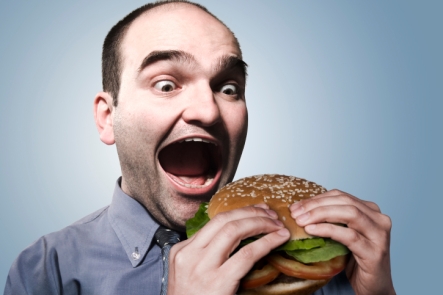Wheat Belly is a new name for beer belly or pot belly … or technically …visceral fat.
It’s also a New York Times best selling book by William Davis, M.D.
You might react to this book in three ways.
1. Love it since the information can or has already helped you lose weight.
2. Are sad since you now want to give up wheat but find it difficult.
3. Hate it for its shaky science.
I was already ‘wheat free’ before reading this book, so I am definitely not in the second category. I loved the information in Wheat Belly but I do have also some major problems with some parts of the book.
First the Pros: What Information You Can Learn & Why I like it
1. Extremely well written and documented.
It takes a pretty tough stance against ‘healthy whole grains’ that is going against a lot of major health advice without sounding fanatical. He does not mention anything without backing up his statements with published research.
2. The intense genetic alternation of wheat and its consequences.
The modern wheat of today is perhaps the most genetically altered plant that we eat. I is perhaps even worse than regular GMO’s we hear about so much It is no longer the staple of life that our forebears ground into their daily bread and became a mainstay of most major cultures and religions.
Instead it has been genetically altered to provide processed food manufactures with the highest yield at the lowest price though monoculture.
No human or animal testing has been done on the new wheat varieties we now use even though they produce radically different proteins. Some of those new proteins are now discovered to be associated with celiac disease but there may be many other consequences.
3. The principles with insulin resistance and glycemic index and how they affect your health.
Right on the cover it announces “Did you know that eating two slices of whole wheat bread can increase blood sugar more than 2 tablespoons of pure sugar”
After reading this book you will understand every part of this statement more clearly and the many ramifications. Wheat has a unique kind of carb that is quickly raises your blood sugar and thus causes a host of health problems. It’s the dumbest of all dumb carbs.
4. Why you crave wheat so much.
Wheat upon digestion yields ‘unique polypeptides’ that have the unique ability to cross the blood brain barrier and bind to opiate receptors. This is what causes the warm fuzzy feeling when you eat wheat and why people have definite withdraw symptoms when they go off wheat.
5. The principle of Acid/Alkaline balance is clearly explained.
One can then understand how an over acid condition effects your health. Grains such as wheat account of 38% of the normal American’s acid load and wheat comprises the major part of that 38%.
6. Theories on aging and the importance of AGE’s (advanced glycation end-products)
You will probably hear more and more about these AGE’s in the future. As you probably can guess wheat is not your friend here.
7. Health dangers of regular gluten free products.
These productscontain too many sugars and simple starches which raise your blood sugars too quickly. Read more about this here. 9 Dangers of Gluten Free Products.
8. How wheat makes you fat.
All of the above categories plus many more is explained.
In my own experience, when people stop wheat consumption they often feel better and often lose weight.
Our 10,000 tests with Vital Health Assessment also confirms this .
In two decades of testing we have only come across a handful of individuals that wheat raised their vitality. For almost everyone else wheat is highly negative. We normally test 15 different grains including gluten grains and they mostly test positive or neutral but not wheat!
The Cons: Problems With The Knowledge
1. The writing is better than the science.
What Belly is almost certainly ghost written as many best sellers now are.
It follows the basic format: start with a simple clear health principle and its consequences, back this up with some strong research and close the deal with personal anecdotes about some character you can’t help but relate to.
Because the writing is so believable and compelling you can easily miss any conclusion or details that are not accurate.
Many doctors and researchers have spoken out against the conclusions in Wheat Belly. They claim the statements and conclusion by Dr. Davis are arbitrary and you can reach completely different conclusions from the same research.
I haven’t studied the research myself. For all I know, these experts speaking against it are spokespersons for the wheat lobby! I do know though, that the trouble with a book like this is that it only give you one side of the argument which may be exaggerated or limited.
2. It’s a diet book.
You just have to wonder if this is like all the other fad diet books? Diet books receive a lot of attention but a few years later and everyone has moved onto the next ‘thing’. We will see.
3. It almost dismisses exercise.
Because the book has to makes it’s point, it downplays exercise and give many different examples of people exercising a lot and still remaining unhealthy or overweight.
If because of this you conclude you can just eat a certain way and not move your body regularly – you will miss a out on a vital element of health.
Exercise is probably the most clearly documented and proven approach to better health in the world and should never be forgotten. Read Walkin Them Blues Away
4. It leaves vegetarians and vegans wondering what to do.
Because Wheat Belly connects weight gain, aging and a host of other problems so clearly with grains the average North American is going to end up stopping them and then start looking for an alternative. The only other food category it mentions positively and with scientific reference are meat and other animal products.
Dr. Davis does recommend vegetables but never bothers to explain the published health benefits as he has does with meat products. His recipes in the index are often with eggs and meats.
The world cannot possibly sustain its 7 billion inhabitants on a mostly meat diet.
- Already meat production creates more CO2 emissions than all the cars and traffic in the world.
- Each pound of beef requires thousands of gallons of water – a natural resource which is going to become more and more scarce in the near future.
- Meat production’s wastes also have severe environmental impact. Read: Is Your Diet Destroying the Environment?
Our own testing -once again with Vital Health Assessment- has shown, that beef is very rarely good for a person and pork is never healthy.
What Do You Think?
What are your experiences with this book or approach? I’m interested in both sides.
Many people are getting great results with the Paleo diet and other low grain approaches.
As you can see, I have written more positive points than negative.
My own general response to this information is that I am once more reminded of inspired not to slip back into wheat consumption. I have added amazon links below.
| US residents | Canada residents |
I also think Dr. Davis goes a little too far with the severe reduction of carbohydrates. In my experience, if you do eliminate wheat, other whole grains eaten in moderation can be healthy. Grains are seeds and all seeds are very powerful. You just have to know when and how to eat them.
Learn To Live and Cook Wheat Free In One Weekend From Your Home:
Many people learn about health principles or buy books but don’t apply them. They don’t follow through because they don’t have the confidence and skills.
That is why we created our Healthy-At-Home Cooking Classes. People get nutritional knowledge but also get live web classes where they learn how to apply that knowledge.
The next cooking class will focus on weight management through acid/alkaline balance, food combining and gluten free eating. Check it out at Healthy Weight Loss Cooking class
Copyright © Randy Fritz You are welcome to share this article with anyone who you think may benefit from this information as long as you give credit to Real Food for Life by including the link to the home page www.RealFoodforLife.com or the direct link to the post.




Thanks Diana for sharing this great article, yes Wheat is a great problem here in the US
We recommend Bread or related Products in Germany and Europe to be eaten in Moderation.
GMO and the intense use of Chemicals like Potassium bromate and Azodicarbonamide
all are linked to kidney and nervous system disorders as well as gastrointestinal discomfort are Illegal to use in Europe.Why the US still using it ,is not understandable and that is also here in the US the No1 Reason for Gluten Sensitivity.
But you still can buy GMO Free Wheat or other grains in the US,I do it is three times the price to conventional Flour or grains, but it is worth it.
My advice to Patients is always ,stay away from anything like Bread ,Pasta in General anyghing processed has Gluten in.
Thanks for the well-rounded article. I’m a little concerned about the idea of a “wheat lobby” which sounds like a conspiracy theory, and the idea that gluten has somehow been changed in wheat (there may be more gluten in some varieties of wheat, but according to the scientists that I have spoken to, the gluten itself hasn’t changed). Yes, wheat has changed over the years through crop breeding, but as far as I know, to date at least, there is no gm wheat on the market. And there are no instances of gm anything causing health problems anyway, so that argument is moot. There is no scientific evidence in most of the arguments against wheat… it has been a staple in most households for generations. Other than people who are truly Celiacs (and they can’t even have a couple molecules of gluten) and people who are gluten sensitive, wheat should be fine in moderation. The main problem, as far as I can see, is that people just plain eat TOO MUCH of EVERYTHING, and don’t move enough! People should get off their couches, out of their cars, and away from computers and just walk for a while. Here’s an article I found interesting: http://nutritionunplugged.com/2012/09/the-glamourization-of-gluten-free/
Anyway, take care!